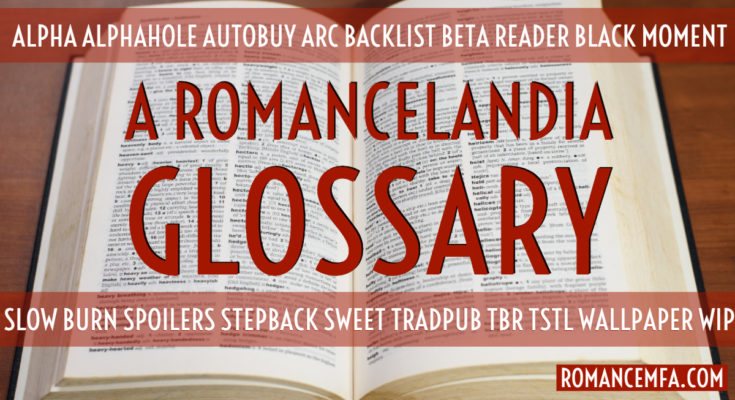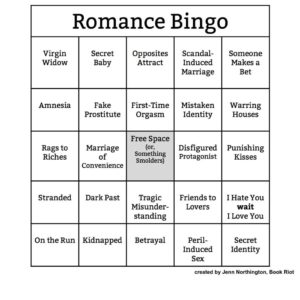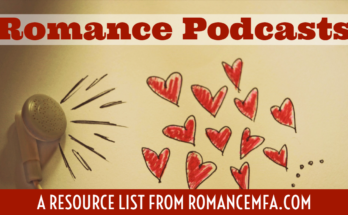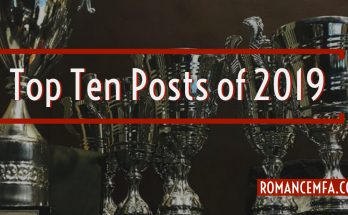It doesn’t take very long in Romancelandia to notice that there are an awful lot of romance abbreviations, slang words, and terms specific to the genre and discussions about it. Whether you’re an author, book blogger, or a reader checking out reviews, it’s worth your while to learn the difference between an alpha and a beta, or between a DIK and a DNF. Here’s the glossary I’ve put together after the last two years of trying to figure out what’s what.
Note: this is not a trope list, but Mindy Klasky has one on her website and Sarah Pesce, the copyeditor who worked with me on Anyone But the Earl, offers a free PDF called “How to use Romance Tropes to Unlock Unlimited Story Ideas” to her newsletter subscribers.
Romancelandia Glossary: Romance Abbreviations, Slang Terms and More
AAR – All About Romance, a long running review site.
Advance – Amount of money paid to author when a publishing house purchases rights to their book, generally paid in several installments.
Alpha – a love interest (hero or heroine) who is in charge of their world situation, a character characterized by extreme competence. See also Alphahole, Beta.
Alphahole – An alpha hero who has crossed the line into toxic masculinity. I have a three part blog series about 1) alphas & alphaholes, 2) the appeal of alphas , & 3) shifting attitudes.
Autobuy – An author whose work you trust will always be awesome, and therefore buy without reading reviews or summaries.
ARC – Advanced Reader Copy. Free books sent to reviewers before books are published.
Backlist – Books which have already been published by an author or publisher.
BDSM – Bondage and Discipline (BD), Dominance and Submission (DS), Sadism and Masochism (SM).
BEA – BookExpo America, major summer book publishing event.
Beta – A love interest secure in their on personality without the need to dominate their partner. See also Cinnamon Roll.
Beta Reader – Early readers who give feedback to an author on their unpublished work. See my discussion of beta readers in this post on first draft editing.
Big Mis – The big misunderstanding, a dramatic conflict between characters which could have been easily solved if they would just talk to each other.
Binge – To read everything you can find in a short amount of time, often to the exclusion of other obligations. Can be applied to a particular author’s work or books in a particular genre or trope.
Black Moment – The point near the end of a book when everything has gone terribly, horribly wrong and it seems all hope is lost.
Personally, I have started thinking of the Black Moment as the "Chris Isaak Moment", but @AuthorJustineC has a post on the saddest classical music — Come, Sweet Death by Bach, anyone? — you can write sad scenes to. https://t.co/myJQVpWHp9 #amwriting #amwritingromance
— Irene Davis, Romance MFA 📝♥️ (@RomMFA) October 7, 2018
Bodice Ripper – Historical romances from the 1970-80s known for misogyny, non-consensual sex, and covers that non-romance readers often see as a current stereotype of the genre. See also Old Skool, Rapemance, Clinch Cover.
Book Birthday – The day your book is released. Involves cake if you want it to. See this post by Hillary Homzie.
Book Boyfriend – The fictional hero you want for yourself, Mr. Darcy being a prime example for many readers.
Book Lovers Con – Successor to RT. Website here.
Category Romance – A short romance novel (55k words) categorized by tropes and heat level by publisher’s line, i.e. Harlequin Blaze or Silhouette Romantic Suspense. See this BookRiot post. See also Single-title Romance.
Catnip – A trope you always want to read more of. See also Autobuy.
Cinnamon Roll – A hero who is straight up sweet and possibly too good for this world. See Olivia Dade’s post here.
Clean Romance – A romance which doesn’t include sex or swearing. May include closed-door sex, or no more than kissing depending on interpretation. See this Book Riot post, “I’m Not Dirty: Why Calling Books “Clean” is a problem” for why this is a controversial term. See also Sweet Romance.
Clinch Cover – A book cover featuring a couple clinging to one another, possibly with their clothes about to fall off, probably with Fabio. Here’s a Kelly Faircloth article from Jezebel on romance covers with lots of examples. See also Bodice Ripper, Old Skool.
Comps – Comparison/comparative/competitive titles used to quickly give agents, editors, and/or readers an idea what a book is like. Originated in query letters but can also be used in marketing. Here’s a tradpub take on comps from Andrea Bachofen for Penguin Random House.
The Princess Bride meets PG Woodhouse: swashbuckling fantasy featuring a dashing (if harried) knight; an irrepressible damsel w/ trust issues; & a dragon w/ an inconvenient case of hiccups. Witty banter, adventure, swordplay, intrigue, romance, & dragons. https://t.co/1rQnsyvgmd pic.twitter.com/sspHDZfZ17
— Keith W. Willis, Wrangler of Recalcitrant Dragons (@kilbourneknight) April 18, 2019
DIK – Acronym for Desert Island Keeper. A book you could happily reread forever.
DNF – Did not finish.
Dubcon – Dubious consent. Here is my resource list on writing consent in romance. See also Noncon, Rapemance.
Duke of Slut – The aristocratic hero who never met a woman he wouldn’t sleep with, and certainly never a woman he wanted to marry, until the heroine. Introduced to the internet by horror author Douglas Clegg aka Andrew Harper via All About Romance.
Earn out – The inflection point when a book’s revenue exceeds its expenses and it begins to earn money. In tradpub, the point when an author begins to receive royalties above the amount of their advance.
F2L – Friends to lovers.
F/F – A female-female romantic pairing.
FMC – Female main character.
Fated Mates – Plot device by which two characters are destined to be together, common in Paranormal Romance. Also a podcast discussing Kresley Cole’s Immortals After Dark series, co-hosted by romance novelist Sarah MacLean and romance critic Jen Prokop. See Insta-love.
Grovel – A Grand Gesture called for when a character (often the hero) has done something Very Bad to their love interest and needs to make up for it. May come after the Black Moment.
A character’s arc may require several grovels to achieve redemption.
HEA – Happily ever after. Required component of a genre romance.
Heat Level – How much sex or passion is present on the page. See also Clean, Sweet, Spicy.
Suggested Romance categories:
– No Smoochie
– 1 Smoochie at the Very End
– Many Smoochies and Some Pets
– We Do The Thing Without Naming the Bits
– We Do Everything and Use the P Word
– We Do Everything and Use the C Word
– Everything + Both C words
– Doin' It on Page 1— Delilah S. Dawson (@DelilahSDawson) March 11, 2019
HFN – Happy for now. A recently acceptable alternative to the HEA in which the couple may be together, but not married and pregnant at the end of the story.
H/h – Hero and heroine. But who decided that the hero always gets a capital letter? See FMC, MC, MMC, and LI for more equitable options.
Lately I’ve realized there are still romance readers who abbreviate the male main character as H and the female main character as h (so H/h for the couple) and I thought we’d moved past that? Because it’s really not a good look.
— Steve Ammidown (@stegan) August 25, 2022
Hybrid author – An author who has works with traditional publishing but has also indie published.
Indie – Also indie author, indie publishing, indiepub, independent publishing. Authors who act as publishing entrepreneurs, coordinating editors, designers, and marketing independently rather than work for a traditional publisher. See also Hybrid, Traditional.
Inspi – Short for “inspirational”, also spelled Inspy. Romance with Christian or religious themes. Probably Sweet or Clean. See this interview with author Angela Breidenbach on inspirational romance.
Insta-love – When one or both love interests immediately falls for the other without an emotional struggle. See also Insta-lust.
Insta-lust – When one or both love interests want in the other’s pants from the first meeting, though emotional connection may take longer. Does not require instant consummation. Contrast with Insta-love, Slow Burn.
JAFF – Jane Austen fanfic, i.e. novels which create original stories using characters from Austen’s novels.
Keeper – A book or romantic partner you would like to keep around for always. See also DIK.
Kill a fairy first – Reading the end of a book to make sure there’s a happy ending. Originates with Kat Mayo of Aussie romance blog BookThingo. See also Spoilers.
LBS – Local book store.
LI – Love interest, the character the MC is falling for.
May-December Romance – A relationship spanning a large age gap.
MC – The main characte or protagonist. May also indicate Multi-Cultural or the contemporary subgenre “motorcycle club.”
Meet-cute – The unlikely circumstances under which romantic protagonists initially meet.
Anyway, here's the meetcute for the book I'm working on now. pic.twitter.com/9gbOHi2DTv
— Irene Davis, Romance MFA 📝♥️ (@RomMFA) October 2, 2018
M/F – A male-female romantic pairing.
MFM – A ménage a trois relationship in which the male characters share sexy times with the female character but not with each other.
MMC – Male main character.
M/M – A male-male romantic pairing.
MMF – A ménage a trois relationship in which the male characters share sexy times.
New York – Metonymous shorthand for the traditional publishing industry, as many publishing houses are based in New York.
Noncon – Non-consensual. Here is my resource list on writing consent in romance. See also Dubcon, Rapemance.
Old Skool – Romance novels of the 1970s and 80s, generally featuring attitudes towards sexuality and consent which are now considered outdated and problematic.
OOP – Out of print.
PAN – Published Authors Network, a Romance Writers of America subgroup.
Pantser – An author who writes without a set plan, i.e. by the seat of their pants. Consider Ada Palmer writing for Tor.com about the complexities of what aspects of story different authors plan or plot. See also plotter.
PB – Paperback.
Plot Bunny – The new and imperative story in your brain that isn’t the one you’re supposed to be writing. See this Nanowrimo Wiki page.
Plotter – An author who plots out a story before they start writing. Consider Ada Palmer writing for Tor.com about the complexities of what aspects of story different authors plan or plot. See also pantser.
Rapemance – A story in which the heroine discovers she enjoys sex after being raped by the hero, with whom she subsequently falls in love. Mainly associated with Old Skool romance of the 1970-80s but unfortunately did not die with the 80s. Here is my resource list on writing consent in romance.
Regency – Metanym used to refer to any historical romance set during England’s Regency Era, i.e., between 1811 – 1820, but may be more broadly used for 1790s-1840s. Preceded by the Georgian Era, followed by the Victorian Era. Ur-Regency authors are Jane Austen and Georgette Heyer.
Reverse Harem – A racist term for polyandry, i.e. multiple male love interests focusing on one female love interest. Originating in manga/anime, this orientalist term has an unfortunate synergy with genre romance’s problematic treatment of the Middle East. See this post from Grace Li on Middle East Representation in Romance Fiction.
RITA – Romance Writers of America award meant to recognize excellence in published romance novels and novellas, but increasingly known for overlooking authors of color and diverse voices. See this article by Lois Beckett in The Guardian. Replaced in 2020/21 with the Vivian awards and immediately noticeable for still trending towards white supremacy.
RT – Romantic Times. Review magazine which ran between 1981 and 2018, or the accompanying conference now succeeded by Book Lovers Con. See this post from Smart Bitches Trashy Books about the end of RT.
RWA – In North America, Romance Writers of America, a “nonprofit trade association whose mission is to advance the professional and common business interests of career-focused romance writers through networking and advocacy and by increasing public awareness of the romance genre.” In Oceania, Romance Writers of Australia is “promoting excellence in romantic fiction, helping writers become published and maintain strong careers, and providing continued support and development.”
SBTB – Smart Bitches, Trashy Books, a long-running review site with active commenters.
Self-published – Also selfpub. See Indie.
Shipping – Advocating for a romantic relationship between two characters who may or may not have a relationship in currently published work. This term originated in fanfic.
Single-title Romance – Traditionally published novels not part of a category romance line which run closer to 75K words.
Slow Burn – A relationship which takes a while to get going. If a couple hasn’t kissed by the halfway mark but are burning up the sheets at the end, the story is probably a slow burn. The opposite of Insta-love or Insta-lust.
Spicy – Romance with sex on the page. Contrast with Sweet. See also Heat Level.
Spoilers – Also “Spoiler alert”. Used in reviews or conversation as a warning that you are about to reveal plot points. Here’s research by UC San Diego psychology professor Nicholas Christenfeld on why spoilers actually enhance our enjoyment of a story. See also Kill a fairy first.
Stan – Portmanteau of “stalker” and “fan,” generally used to self-identify as a superfan of something. See this Bustle article by Maddy Foley on origin, use, and further definition of the term.
Stepback – A second cover image behind the front cover, generally showing the character or couple in a slightly different pose. Here are favorite step-backs from one reader.
By request, the stepback! 😍😍😍💋💋💋🔥🔥🔥 pic.twitter.com/df8FAQWj2t
— sarah maclean (@sarahmaclean) May 24, 2018
Sweet Romance – A feel-good romance without sex, probably not even closed-door sex. Here’s a post from author Cathy McDavid on the confusion between “sweet” and “clean”. See also Clean Romance, Heat Level, Inspi.
Traditional – Also traditional publishing, tradpub, New York published, or New York. Books published by publishing company, that arranges editing and cover design, and possibly promotional material. See also Indie, Hybrid.
TBR – To be read. Often “TBR pile.”
Trope – Story elements often repeated within a genre. Can be used to surprise readers if the usual expectation is subverted, or to bore them if a story consists of nothing but tropes. It behooves an author to know the tropes of their genre! Here’s a handy Romance Trope Bingo Card from this BookRiot piece on Story Tropes Bingo for (Almost) Every Genre by Jenn Northington.
TSTL – A character who makes repeated bad decisions, leading to the judgement that they are “too stupid to live.”
UBS – Used book store.
Wall-banger – A book so bad you’d like to throw against the wall.
Wallpaper Historical – A historical romance in which the trappings are of a historical period but the characters and events have little grounding in historiography. See this Smart Bitches, Trashy Books post for further definition and discussion of controversy around this term, or this post from Historical Hoydens about the tension between historical romance and historical romance.
WIP – Work in progress.
Principal References
- “Afkortingen”. http://www.romantischeboeken.nl/afkortingen Undated.
- “HEAs and Alphaholes: A beginner’s guide to romance terms”. BookPage. https://bookpage.com/the-book-case/22653-heas-alphaholes-beginners-guide-to-romance-terms 8 May 2018.
- Kirton, Charlotte. “Totally Bound’s Erotic Romance Glossary”. Totally Bound. https://www.totallybound.com/blog/erotic-romance-glossary 15 Sept 2015.
- Lane, Elizabeth. “ROMANCE 101 SERIES + WEEKLY RECIPES”. http://www.cookupromance.com/2019/01/28/romance-101-series-weekly-recipes 28 Jan 2019.
- Tripler, Jessica. “10 Terms the Romance Fandom Taught Me” BookRiot. https://bookriot.com/2015/05/15/10-terms-romance-fandom-taught 15 May 2015.
See also
- Anime Glossary
- Asexuality Archive Glossary
- Book Publishing Terms
- Glossary of Copy Editing Terms
- Fanfic Glossary
- The Internet Dating Slang Terms You Need to Know
- Planned Parenthood Sexual Health Glossary
- Regency Glossary
- TV Tropes. Click with care – you can lose whole weeks here.




